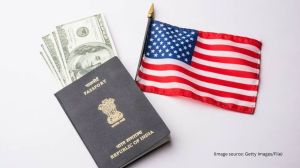To be or not to be
All may be fair in love and war, but clearly when it comes to love versus war, the former has a definite edge. With romantic Elizabethan ...

All may be fair in love and war, but clearly when it comes to love versus war, the former has a definite edge. With romantic Elizabethan fantasies vying competitively with World War II dramas at this year’s Academy Awards — that too sans any predictions of a Titanic-like deluge — Shakespeare in Love swooped up seven Oscars.
And make no mistake; Shekhar Kapur’s Elizabeth may have posted a spirited challenge and host Whoopi Goldberg’s may have regaled all with her burst of wit as she came on stage dressed as the virgin queen, but Hollywood’s — and by extension, the rest of world’s, given America’s status as the world sole cultural superpower — star of the moment is the 16th century bard from Stratford-on-Avon.
What does this portend for poor William, who has already been deemed the man of the millennium in a high-profile poll? Cleary Americanisation of the most popular playwright is on the anvil, which is a somewhat disturbing proposition. While Shakespeare Societies around theworld may have over the centuries given his enduring tragedies a local spin, a revival in the land of the golden arches is an entirely different matter. Admittedly, the English bard’s dramas have all the makings of extravagant Holly-wood melodramas, but what of his legacy? Celluloid adaptations of Jane Austen’s works provide a clue with their distillation of soppiness and cleansing of social comment. Even America’s favourite children’s writer, Louisa May Alcott, did not fare any better recently after the highly acclaimed, and self-professedly feminist, Hollywood adaptation of her classic Little Women.
Worried educators and parents may have thrilled as their TV-watching kids rushed to the bookstores for the book, but what most of them took home was not Alcott’s prose but a rewritten edition in "contemporary English" based on the screenplay. So even as the expected interest in Shakespeare is awaited, what with Michelle Pfeiffer starring in the forthcoming William Shakespeare’s Midsummer’s Night Dream,and hopes of enticing the MTV generation are voiced, chances are that the dog-eared copies of his plays they stroll around with will be translations into turn-of-the-century Yankeeisms.
And with exponentially growing viewership estimates, merchandise surely cannot be far behind. So etchings of literature’s most famous shag will no longer be limited to offbeat bookstores in Paris and New York, and profit-sniffing companies will no doubt rush in to claim copyrights for their coffee mugs, sneakers and what-have-you. Such consumerist worries may seem a trifle trivial, but then it is debatable whether Shakespeare in Love’s sweep of the Oscars can be attributed solely to its cinematic excellence — Miramax earlier courted controversy by spending an estimated $2 million in advertisements targeted at Academy Awards voters. However, Shakespeare enthusiasts need not agonise over his transformation into an uneasy Hollywood icon. His legacy will surely endure in the shoestring productions in the unlikeliestof locations and languages around the world.
Photos




- 01
- 02
- 03
- 04
- 05



























